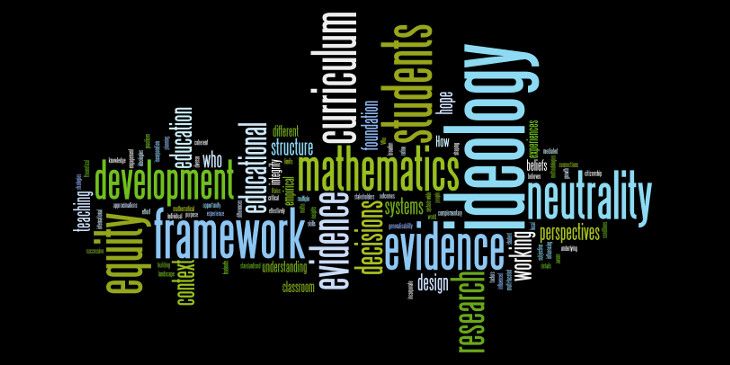30 June 2016

Executive summary: Roles and limits of curriculum frameworks in mathematics education
Every decision about educational systems and curriculum development takes place within a social and an ideological context. From individual lessons to curricula to entire educational systems, people design and debate the paths students will follow according to their various beliefs about what education currently is, what it can be, and what it should be. Cambridge Mathematics does not seek to claim or define an ideology; on the contrary, we are working to base our framework on evidence from educational research to support both the integrity of the subject and connections to what students will experience in the classroom. However, we remain aware that our curriculum framework development efforts take place in the context of our own experiences and beliefs. Where, then, might the Cambridge Mathematics curriculum framework sit in this landscape? While there are many elements of educational ideologies that are relevant to our work, we explore three themes that link ideology and curriculum framework development: equity, neutrality, and evidence. This is a summary of the corresponding working paper, "Roles and limits of curriculum frameworks in mathematics education."
Equity
How many will be users or designers of sophisticated maths? At what points do we decide who is who? To what extent can students evaluate and participate in these decisions?
If an educational system’s strategies for supporting equity are effective, then demographic differences among students shouldn’t be predictive of student outcomes (NCTM, 2014). Strategies for achieving and upholding equity require support on multiple scales and depend on system-wide and local decisions in the political arena. Curriculum structure has a role to play, the success of which depends both on the structure itself and how it relates to the system in which it functions.
Cambridge Mathematics, in line with most other curriculum development efforts, believes that all students should have the opportunity to study mathematics. However, unlike many efforts, which are often by nature heavily influenced by pre-existing conditions and practices, the force shaping our first and most definitive choices is our incorporation of the best current understanding of the development of conceptual and procedural knowledge in mathematics.
We hope that a coherent structure will enable students to move laterally, pulling in appropriate support, so that no students are prevented from progressing as they wish. Unless students can move between paths, we risk diminishing the pool of students who rise to the highest levels of work in the practice and teaching of mathematics. This is an ambitious goal for any single effort, but we hope that by undertaking this goal, Cambridge Mathematics will be paving the way for successive approximations of a curriculum framework that can achieve it.
Evidence
How do we refine existing approaches and incorporate new ones?
An enormous amount of research has been done in mathematics education, spanning the gamut of perspectives on teaching and learning. One can find some manner of evidence to support practically any argument. Currently, the evidence that education systems view most favourably in curriculum planning comes from standardised tests and empirical studies involving randomised controlled trials (Walshaw, 2010). However, the NCTM Research Advisory Committee, 2003, noted that restricting the evidence that is used to inform mathematics teaching and learning to these sources may bypass equally essential insights that can only be obtained through other research designs. Cambridge Mathematics takes a multi-faceted view of appropriate evidence, drawing on research that:
- has the greatest possibility for application in the classroom
- involves a theoretical basis and empirical design that are appropriate to the research question(s) and are reasonable according to the current state of well-supported lines of inquiry in Education and related fields.
Neutrality
Who sets the baseline for neutrality? By design, a framework is the result of a series of decisions made in order to effectively highlight the parts of a system that are deemed most important for a particular purpose in a particular context. These decisions are mediated by different considerations for each of the various stakeholders in curriculum development and implementation (Apple, 2004), and because these often involve tradeoffs and unequal weighting, complete neutrality is never achieved. We aim to broaden the generalisability of the Cambridge Mathematics framework by building its foundation in the integrity of the subject, incorporating the available evidence related to conceptual and procedural dependencies and interconnections. We (or others) may then layer more subjective or localised decisions onto that foundation, but we are working to make the framework as applicable as possible to a variety of goals and contexts by including a balance of international perspectives through research and consultation.
Conclusion
Any mathematics framework underlying curriculum development will be one of many factors influencing the experiences students have with mathematics throughout their educations, but the details of the framework can make a difference. Cambridge Mathematics is working to build a framework that incorporates evidence from a high-quality research conducted according to diverse and complementary perspectives and employing a range of appropriate methodologies. We recognise that we cannot provide a substantially different context for implementation than other frameworks face, but we hope that we can build a solid foundation for the development of mathematics curricula around the world which enable desired levels of engagement with the domain of mathematics, provide students with the skills and understanding they need in the workplace, and support the growth of critical mathematical citizenship.
References
Apple, M. W. (2004). Ideology and Curriculum (3rd ed.). New York, NY: Routledge. National Council of Teachers of Mathematics. (2014, April 18). Access and Equity in Mathematics Education: A Position of the National Council of Teachers of Mathematics. National Council of Teachers of Mathematics. Retrieve.
NCTM Research Advisory Committee. (2003). Educational Research in the No Child Left behind Environment. Journal for Research in Mathematics Education, 34(3), 185. Retrieve.
Walshaw, M. (2008). Best evidence research redefined in mathematics education. In Bishop, A. J., de Freitas, E., Nolan, K., & Walshaw, M. (Ed.), Opening the Research Text (p. 13). doi:10.1007/978-0-387-75464-2_2
Read the full report